Kerry: Ukraine talks will continue
March 5, 2014 -- Updated 2039 GMT (0439 HKT)
STORY HIGHLIGHTS
- NEW: "We are all concerned," says Russia's Lavrov
- The United States, Britain and Ukraine call for international observers in Ukraine
- Russia must face costs if crisis isn't calmed, U.S., UK and other leaders say
- Russian lawmakers threaten seizure of EU, U.S. assets in Russia if sanctions are imposed
Kiev, Ukraine (CNN) -- [Breaking news update at 3:39 p.m. ET, 10:39 p.m. in Kiev]
Foreign ministers -- including those from Russia and Ukraine -- meeting Wednesday in Paris "agreed to continue intense discussions in the coming days," U.S. Secretary of State John Kerry said. Their goal is "to see how we can help normalize the situation, stabilize it and overcome the crisis," he added.
In additional developments:
-- Kerry said the intention to "overcome the crisis" in Ukraine is "shared exactly" by foreign ministers who met Wednesday in Paris, including those from Russia and Ukraine.
-- "Russia's violation of Ukraine's sovereignty and territorial integrity has actually united the world in support of the Ukrainian people," Kerry said. Ukrainian officials claim that Russian troops have entered its territory on the Crimean peninsula by the thousands, something that Russian leaders deny.
-- Kerry said it was up to Russia "to choose to de-escalate the situation" in Ukraine by having its troops return to their military bases and "welcome international observers and human rights monitors" into Ukraine's Crimean peninsula. "The United States is ready to work with all parties" -- including Russia -- "to make that happen," Kerry added.
[Original story, posted at 3:25 p.m. ET, 10:25 p.m. in Kiev]
NATO reviews relationship with Russia over Ukraine crisis
(CNN) -- Western diplomats met Wednesday on the crisis in Ukraine as NATO warned it was reviewing its relationship with Russia and threats of sanctions -- and retaliations -- flew between Europe and Russia.
At NATO headquarters in Brussels, Belgium, Secretary General Anders Fogh Rasmussen told reporters that the international body had decided to "put the entire range of NATO-Russia cooperation under review" to send "a clear message Russia's actions have consequences."
Planning for the first NATO-Russia joint mission -- the maritime escort of a U.S. ship involved in neutralizing chemical weapons -- has been suspended, though the decision will not affect the destruction of chemical weapons, he said.
And no staff-level civilian or military meetings with Russia will take place "for now," Rasmussen said.
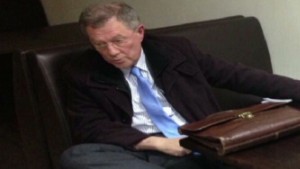
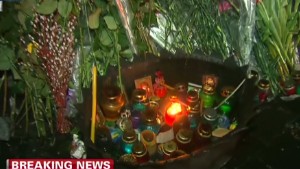
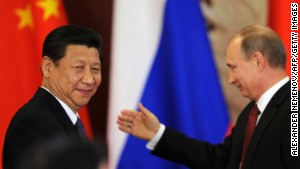
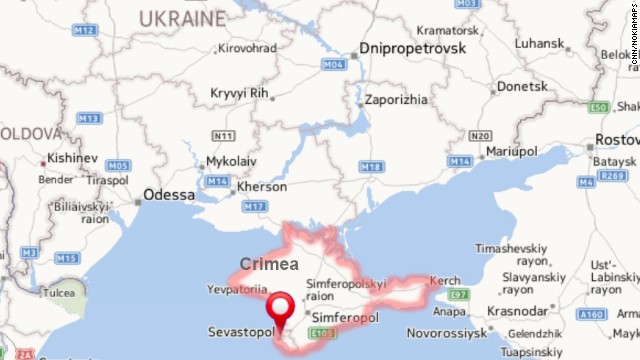
But, he added, the organization was keeping the door open for political dialogue.
In addition, he said, the organization will "intensify" its partnership with Ukraine, stepping up engagement with its civilian and military leadership through increased joint training and exercises and doing more to include Ukraine in multinational projects.
Rasmussen's comments came after meetings in Paris between foreign ministers from the United States, United Kingdom, France, Germany and Russia.
U.S. Secretary of State John Kerry and his Russian counterpart, Sergey Lavrov, met three times Wednesday in Paris. They greeted each other cordially during one session at the Russian Embassy, according to the pool reporter traveling with Kerry.
Kerry urged direct talks between Russia and Ukraine to resolve the crisis, the official said.
One of those meetings included a "brief and informal discussion" among Kerry, Lavrov, Britain's William Hague, France's Laurent Fabius and German Foreign Minister Frank-Walter Steinmeier, the official said.
"We are all concerned at what is happening there (Ukraine)," Lavrov told reporters. "We agreed to continue those discussions in the days to come to see how best we can help stabilize normalize the situation and overcome the crisis."
By day's end, Lavrov had not met with his Ukrainian counterpart, Andrii Deshchytsia.
But Ukrainian acting Economy and Trade Minister Pavlo Sheremeta told CNN that he believed there had been some communication between officials from the two countries.
"I think our prime minister talked to the Russian prime minister," he said.
German Chancellor Angela Merkel called Russian President Vladimir Putin on Wednesday and the two leaders discussed possible moves to normalize the situation, the Kremlin said.
Possibility of sanctions
Russia has been warned that possible sanctions will be on the agenda when European Union leaders meet Thursday in Brussels if no progress is made in ending the showdown sparked by Russia's military intervention in Ukraine's Crimea region.
The impact of sanctions, if they were imposed, might be felt by other countries, too. In a tit-for-tat move, Russian lawmakers are drafting a law that would allow Russia to confiscate assets belonging to U.S. and European companies if sanctions are slapped on Moscow, Russian state media reported.
The Russian threat was not specific, but numerous large European and U.S. companies have interests in the region and Russia is a major supplier of gas to Europe.
What happens at the EU meeting on sanctions "will be partly determined by Russia's willingness to sit down with Ukraine," Hague said.
If no progress can be made on de-escalating the situation, then there will be "costs and consequences," Hague said.
Russian forces remain in effective control of Crimea, a Black Sea peninsula of Ukraine that is home to a large Russian naval base, in a standoff with Ukrainian forces loyal to the new, interim government in Kiev.
Fears of instability
Tensions mounted on the ground in Crimea. Robert Serry, the U.N. envoy to Ukraine, was threatened by armed men in Sevastopol who wanted him to get into a car, U.N. Deputy Secretary-General Jan Eliasson told reporters Wednesday.
The United Nations expects local authorities to provide protection for Serry to return to his hotel from a cafe where he had stayed put, Eliasson said. CNN affiliate ITV reported that Serry had agreed to leave Ukraine immediately.
In the eastern Ukrainian city of Donetsk, protestors took over a local government building and were seen heading to the local treasury, witnesses told CNN Wednesday.
The protesters were calling for a referendum on the status of the Donetsk region and said they want to see the region gain more autonomy.
Kerry: Clear legal obligations at stake
In the Paris discussions, Kerry reminded Moscow that it had, like Washington and London, signed an agreement in 1994 -- when Ukraine agreed to give up its nuclear weapons -- "to refrain from the threat or use of force against the territorial integrity or political independence of Ukraine."
There are "very clear legal obligations that are at risk in this," Kerry said.
Ukrainian acting Foreign Minister Andrii Deshchytsia said he hoped for bilateral and multilateral consultations with Russia.
At issue is Russia's insistence that the new, acting government in Ukraine is not legitimate.
Western powers argue that ousted President Viktor Yanukovych fled the country, leaving a void that had to be filled. They point out that the interim government was voted in by a large majority of parliament, including members of Yanukovych's Party of Regions.
In a joint statement after their meeting, the United States, the United Kingdom and Ukraine called for international observers to be deployed to Ukraine.
This, they said, "would help address any concerns regarding irregular forces, military activity and the treatment of all Ukrainians irrespective of their ethnicity or spoken language."
Russia has cited a putative threat to ethnic Russians in Ukraine as a justification for military intervention in the country.
The Organization for Security and Co-Operation in Europe, a regional security bloc, said Wednesday it had sent 35 unarmed military observers to Odessa, Ukraine, in response to a request from Kiev. The team plans to try to enter Crimea on Thursday, an OSCE spokesman said.
France: Invasion violates international law
On Tuesday, Putin denied Russian troops were in Crimea, but said he was reserving the right to take military action to protect the safety of Russian-speakers in eastern Ukraine.
He slammed the interim government, which replaced Yanukovych, a Russian ally, as illegitimate.
Fabius, the French foreign minister, set out a different point of view Wednesday as he declared that sanctions could be in the cards.
"The invasion of one country into another is contrary to all international laws," Fabius said via Twitter. "We must return to dialogue and to bear in mind that Ukraine should work with Russia and the EU."
On Tuesday, Kerry accused Russia of making up reasons for intervention in Ukraine, saying "not a single piece of credible evidence supports any one of these claims."
Diplomatic efforts
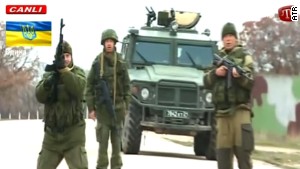
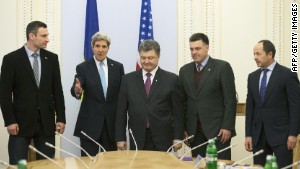
NATO Secretary General Rasmussen and Ukrainian acting Prime Minister Arseniy Yatsenyuk are due to meet Thursday.
EU Commission President Jose Manuel Barroso announced Wednesday in Brussels that the EU would offer an aid package worth $15 billion (11 billion euros) to Ukraine. He said the package was "designed to assist a committed, inclusive and reforms-oriented" Ukrainian government.
Barroso said on Twitter that the aid package would consist "of immediate short and medium term measures offering trade, economic, technical and financial assistance to #Ukraine."
During his visit to Kiev on Tuesday, Kerry announced the United States will give Ukraine's interim government $1 billion in loan guarantees. Senior U.S. administration officials told CNN the move would help insulate the Ukrainian economy from the effects of reduced energy subsidies from Russia.
Ukrainian authorities have said they will need $35 billion by the end of 2015 to keep their struggling economy afloat.
Meanwhile, the EU said it had acted to freeze what it suspects are misappropriated Ukrainian state funds held in Europe by 18 people whom it did not identify.
Lavrov: Military coup in Ukraine
Lavrov, speaking Wednesday morning in Madrid, Spain, showed no signs of retreating from the position taken Tuesday by Putin.
The Russian foreign minister said the crisis had begun when the international community failed to react to the anti-government protests that preceded Yanukovych's ouster.
"There was a military coup, and the legitimate president was removed by methods which were not in the constitution or legislation," Lavrov said. "If we are so lenient to the people who are trying to govern our neighbor, everyone must realize a bad example can be spread and there shouldn't be any double standards."
Lavrov restated Putin's denial that the troops who control Crimea are Russian, saying the troops in question are "self-defense" forces over whom Russia has no control.
Moscow wants an agreement that was signed February 21 between the government of the ousted Yanukovych and the opposition to be the basis of any settlement. It promised new elections, constitutional reforms and the disbanding of illegal armed groups.
Andriy Parubiy, secretary of Ukraine's Security and Defense Council, told reporters in Kiev on Wednesday that the situation in Crimea was calmer than it had been Tuesday.
Parubiy said Russian forces had made no new military gains on the peninsula but warned of the danger of new attempts by pro-Russian protesters to take over government buildings in eastern and southern Ukraine.
Warning shots were fired Tuesday by the Russia side during a confrontation with Ukrainian forces at a military base near the port of Sevastopol before the situation was defused.
Col. Sergei Astakhov, assistant to the chief of the Ukrainian Border Service, told CNN its officers have increased security checks at the Russian border, particularly in the southeast.
During the prior day, he said, they turned back more than 300 people seeking to enter from Russia whom they suspected of participation in disturbances.
On Tuesday, Putin said he had ordered Russian troops back to their bases after they participated in military exercises near the border, a move that some observers saw as a positive sign.
Several U.S. officials said that though those Russian forces had, for the most part, not returned to their barracks, they saw no major strategic movements by them on either side of the border -- for the second consecutive day.
CNN's Michael Holmes reported in Kiev, and Laura Smith-Spark wrote and contributed in London. CNN's Pete Burn, Tom Watkins, Elise Labott, Richard Roth, Khushbu Shah, Neda Farshbaf, Damien Ward, Carol Jordan and Larry Register contributed to this report.
We recommend
From around the web
Obamacare public perception turning(iHealth Care Updates)
Liam Neeson Tops Box Office Once Again With ‘Non-Stop’(The New York Times)
March 3, 2014 -- Updated 2352 GMT (0752 HKT)
What sanctions will there be? What kind of aid will Ukraine receive? Will there be fighting between Russian and Ukrainian troops?
March 5, 2014 -- Updated 1607 GMT (0007 HKT)
Is the seizure of Crimea a challenge to the European Union to defend its values?
March 5, 2014 -- Updated 1232 GMT (2032 HKT)
Obama and Putin have very different ideas about the reality in Ukraine -- compare their stories yourself:
March 5, 2014 -- Updated 1235 GMT (2035 HKT)
The west has misjudged the way Russia would respond to seeing neighbor in chaos, writes a former Russian government adviser.
March 1, 2014 -- Updated 2111 GMT (0511 HKT)
It's a conflict culled from the pages of the Cold War. With Ukraine possibly teetering on the brink of war, here are three things you need to know.
March 4, 2014 -- Updated 1330 GMT (2130 HKT)
Angela Stent: Vladimir Putin's move into Crimea is central to his view of Russia's interests.
March 4, 2014 -- Updated 0052 GMT (0852 HKT)
What's at stake in the conflict between the West and Russia over Ukraine is not just the future of Crimea, it's the future of international order.
Here are five reasons the world's largest economies are watching what happens in Ukraine.
March 1, 2014 -- Updated 0212 GMT (1012 HKT)
CNN's Tom Foreman breaks down why Ukraine is important both politically and geographically.
February 28, 2014 -- Updated 1250 GMT (2050 HKT)
The situation is serious and the risks are enormous. Crimea is the flashpoint. If Ukraine unravels, it will begin there, says Frida Ghitis.
The current crisis is largely fueled by Ukraine's mixed loyalties and linguistic divisions. See where the country is split.
February 24, 2014 -- Updated 1654 GMT (0054 HKT)
Ukrainians got their first glimpse of the grounds of President Viktor Yanukovich's residence outside Kiev.
February 20, 2014 -- Updated 2112 GMT (0512 HKT)
See how Independence Square has been so devastated.
February 20, 2014 -- Updated 1119 GMT (1919 HKT)
CNN's Miguel Marquez reports on a young Kiev woman's compelling plea for freedom that has gone viral.
February 20, 2014 -- Updated 1030 GMT (1830 HKT)
A drone offers a unique perspective of the protests in Independence Square in Kiev, Ukraine.
Have you witnessed the protests in Ukraine? Send us your images and video, but please stay safe.
Most Popular
Today's five most popular stories
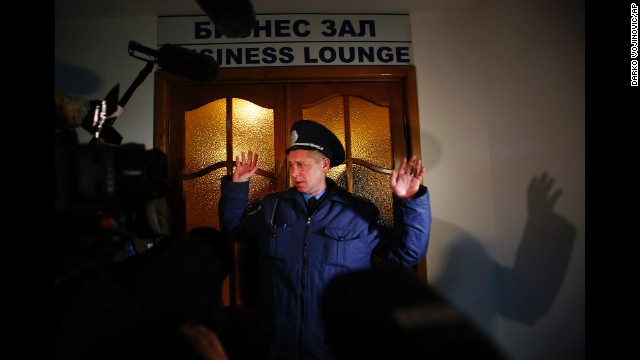 A Ukrainian police officer gives instructions to members of the media in front of the business class lounge of the Simferopol, Ukraine, airport on Wednesday, March 5.
A Ukrainian police officer gives instructions to members of the media in front of the business class lounge of the Simferopol, Ukraine, airport on Wednesday, March 5.

































No comments:
Post a Comment